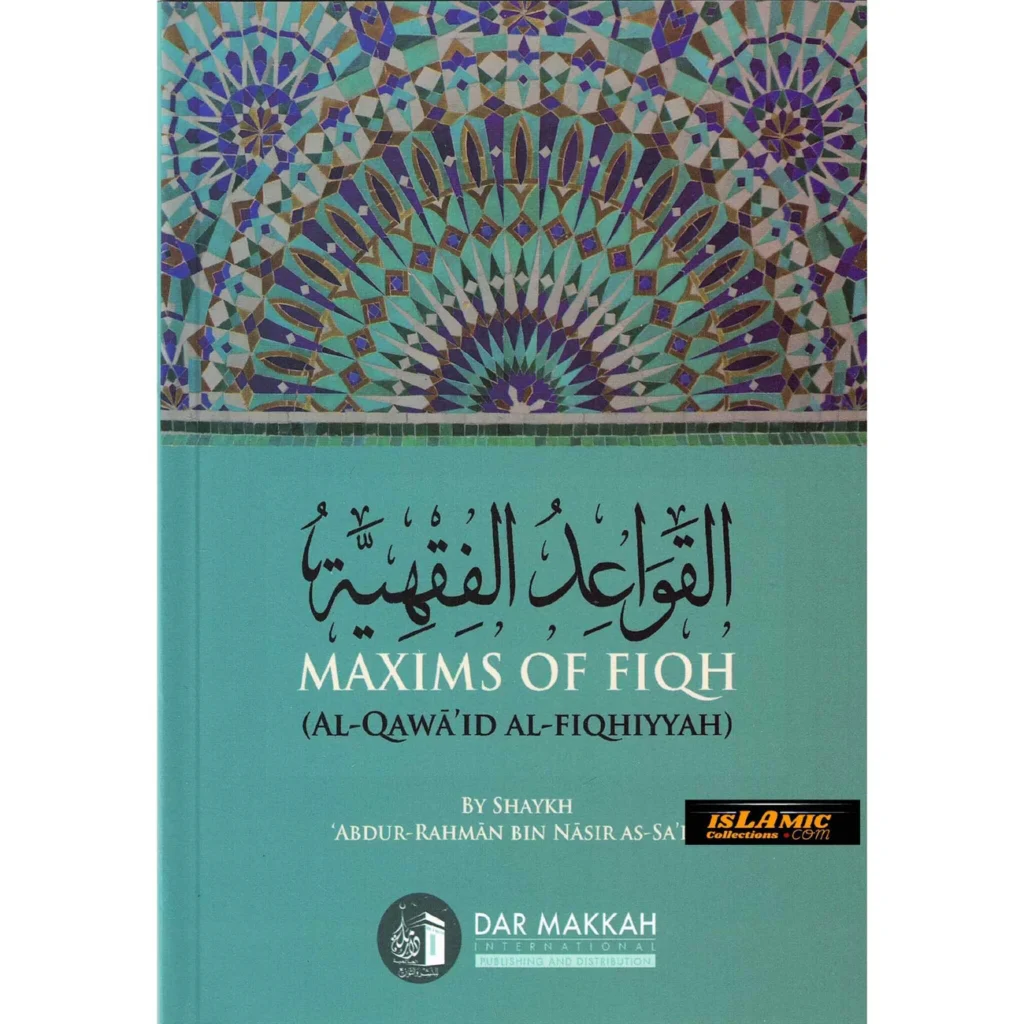
” Maxims of Fiqh ” The Islamic jurisprudence science, or fiqh, has its roots in rules that enable scholars to deduce rulings. An important source in doing so is legal maxims, or Al-Qawaid Al-Fiqhiyyah in Arabic. These maxims encase the general legal implications applicable to numerous situations and serve to solve novel or tricky problems in the light of Shari’ah.
Shaykh Abdur-Rahman bin Nasir As-Sa’di, the great Hanbali scholar, has given a concise and brilliant exposition of these maxims in his treatise Maxims of Fiqh. Students of knowledge, scholars, and laymen alike find this book useful because it couples theoretical precepts with actual Islamic rulings in a profound yet intelligible manner.
About Shaykh As-Sa’di’s Legacy
Shaykh As-Sa’di had a profound knowledge, eloquent speech, and the power to make matters easy. His work in the field of tafsir, fiqh, and aqidah is greatly admired across the Muslim world. Many other scholars were also taught by him, such as Shaykh Ibn Uthaymeen, who was a prominent figure in Islamic thought today.
His works highlight simplicity in religion, moderation, and profound insight into Islamic fundamental values. Maxims of Fiqh captures his pedagogy to the letter. It presents advanced scholarship in an accessible and applicable format so that readers can enjoy the richness of Islamic jurisprudence without being bogged down.
What This Book Covers
The volume includes the main legal maxims that Islamic jurists concur on, including “Matters are judged by intentions” and “Harm must be removed.” Each maxim is preceded by a short introduction with examples and contexts where the maxim is used. This makes it easier for the reader to understand how such principles work in real life.
Shaykh As-Sa’di’s commentary also highlights the wisdom behind the Shari’ah, showing how these maxims preserve justice, mercy, and ease in legal rulings. This approach helps students not only memorize the rules but also appreciate the reasoning and spiritual insight embedded within Islamic law.
Importance for Everyday Muslims
Although legal maxims are traditionally learned in higher level fiqh classes, this book brings the maxims within reach of anyone interested in gaining a greater depth of understanding of Islam. The maxims reduce difficult rulings to an underlying principle that will direct ethical and religious choices. For instance, knowledge of “Certainty is not removed by doubt” will aid one in addressing difficulties in wudu, salah, or ordinary transactions.
This information is particularly useful in a period when Muslims encounter numerous new questions and challenges. Understanding how to utilize fundamental maxims can lead a person in making intelligent and spiritually correct choices. It makes one more confident in the religion and provides insight when confronted with contemporary issues.
Clarity Without Compromising Depth
One of the strengths of this book is how well it balances simplicity and complexity. While some books either oversimplify to the point of inaccuracy or become overly technical, Shaykh As-Sa’di is able to explain profound ideas in plain Arabic (and in English translations), being academically sound while still being practical.
Students of knowledge prefer this style because it establishes their foundation in usul al-fiqh without overloading them. Even beginners to fiqh will find the approach easy to follow. This makes it suitable for self-study, use in classrooms, or discussion in study circles or seminars on Islam.
Relevance in Modern Contexts
Islamic law is dynamic; it still provides direction in every age. The book assists readers in recognizing how eternal precepts can fit into contemporary situations. From business agreements to medical ethics, and from family law, these maxims are similar to a compass that always aligns Islamic decisions with God’s will.
Maxim-based ruling extraction capability is crucial in non-Muslim communities or multicultural settings where certain fiqh precedents are not always present. This book makes one ready to think like a jurist based on revelation yet cognizant of reality.
A Must-Have for Libraries
Any serious Islamic collection be it personal, academic, or institutional would be enriched with the inclusion of Maxims of Fiqh. Its merit is not merely in content but in how it constructs legal thinking. The treatise is compact but thick, tiny in volume but large in effect. It is a complement to other main treatises in usul al-fiqh and can function as an introduction to more comprehensive studies.
Teachers can reference it as a curriculum. Parents can utilize it to teach adolescents about how Islam deals with law. Students can utilize it as preparation for advanced education. The availability and insight crammed into this little book make it a valuable teaching aid.
Why It Stands Out
Many books on Islamic law focus on individual rulings, but this one focuses on the framework behind those rulings. That is what makes it unique. Rather than simply stating halal or haram, it explains the why behind Islamic legal thinking. This builds trust in the Shari’ah and helps Muslims see its beauty, logic, and justice.
Shaykh As-Sa’di’s ability to distill centuries of juristic wisdom into easy-to-remember principles is a testament to his scholarly precision. His book is not just academic it’s inspirational. It encourages readers to think with clarity, act with confidence, and approach Islamic rulings with both respect and reason.
Read more: The Campaigns of Sayyidina Muhammad